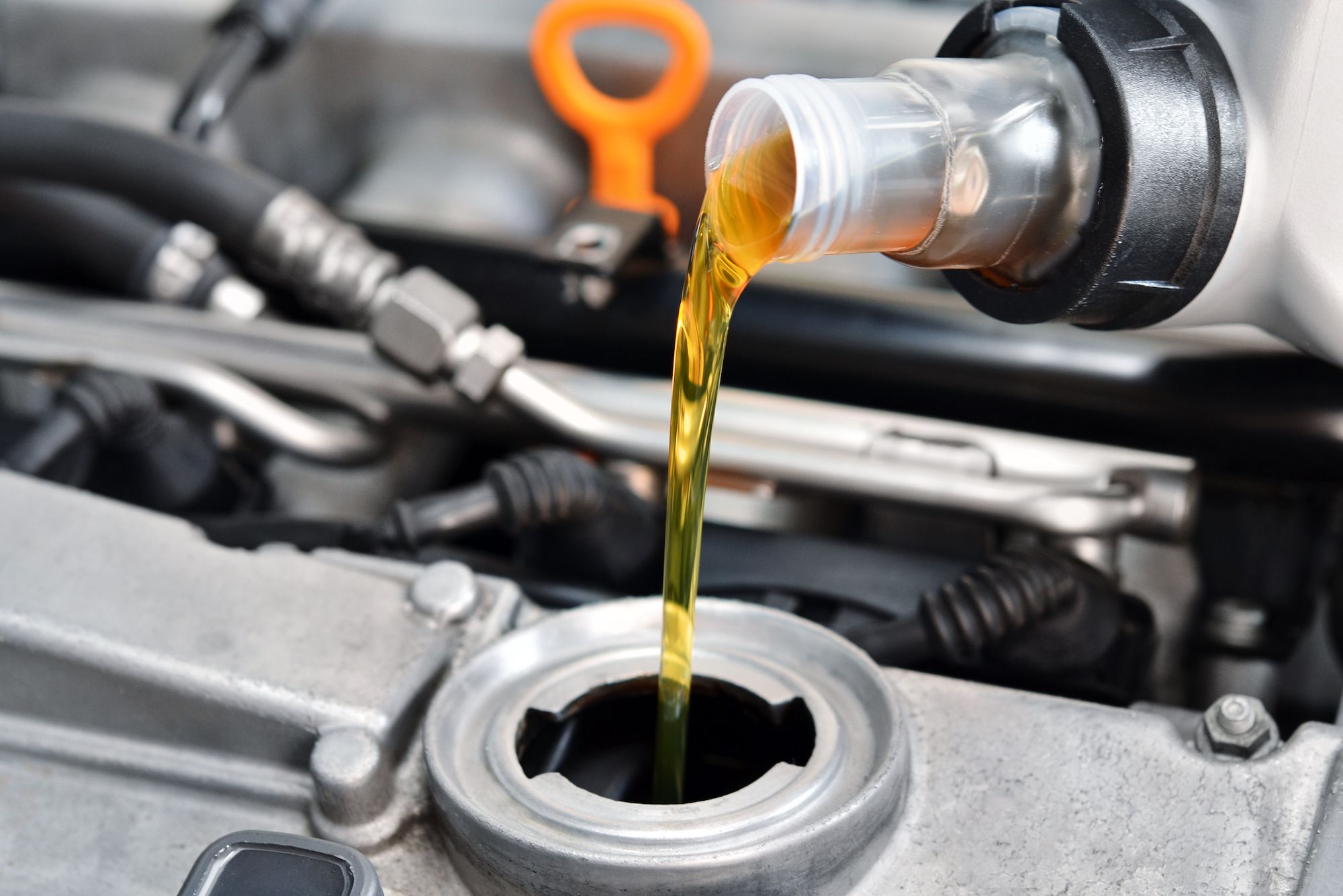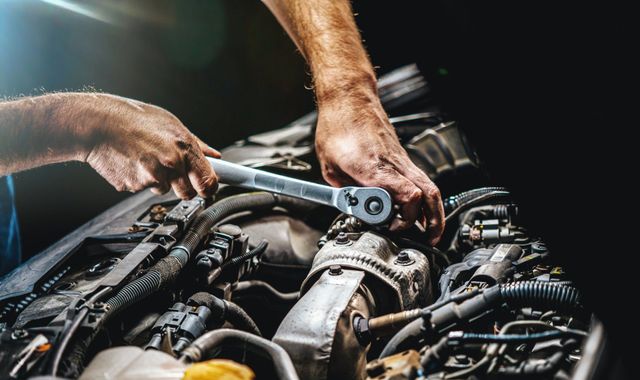All Categories
Featured
Your lorry's engine is a complicated system that relies upon many interconnected parts to work correctly. One of one of the most critical components that makes sure every little thing runs smoothly is the timing belt. Frequently ignored, the timing belt plays an essential role in keeping your engine synchronized and operating at peak efficiency. Overlooking its maintenance or replacement can lead to severe, costly damage to your engine. In this write-up, we'll check out the relevance of timing belt replacement and why it's crucial to your engine's long life.
What Is a Timing Belt and Just How Does It Function? The timing belt is a rubber or enhanced composite belt that connects the crankshaft to the camshaft in your engine. These 2 components have to operate in sync for the engine's shutoffs to close and open at the correct times during the combustion cycle. The timing belt controls this synchronization, making sure that the shutoffs and pistons do not clash.
![]()
As your engine runs, the timing belt continuously relocates to maintain these elements lined up. In time, the belt undergoes deterioration from rubbing, warmth, and engine resonances. If it damages or becomes loose, the crankshaft and camshaft will no much longer be synchronized, causing engine misfires, loss of power, or, in the worst instance, serious engine damage.
Why Timing Belt Substitute Is Vital. Prevents Serious Engine Damages: If the timing belt breaks while the engine is running, the pistons can clash with the valves, causing bent shutoffs, harmed pistons, and even a broken engine block. This type of damage typically requires comprehensive and pricey fixings or an entire engine replacement. Changing the timing belt before it falls short is a affordable and basic method to avoid such devastating repercussions.
![]()
Guarantees Smooth Engine Operation: A properly maintained timing belt helps keep your engine running efficiently by preserving the proper synchronization between the crankshaft and camshaft. When the timing belt is broken or extended, the timing of the engine's valves might be off, causing engine misfires, harsh idling, or delaying. Changing the timing belt at the recommended interval makes sure that the engine runs as it was created to, maximizing efficiency and efficiency.
Conserves You Money: Although replacing the timing belt may appear like a considerable ahead of time expense, it's even more economical than the cost of fixing or changing a harmed engine. The labor entailed in changing the timing belt is a lot less expensive than fixing engine components that are damaged due to a broken belt. Routine timing belt replacement can save you thousands of bucks over time by avoiding engine failing and costly repair services.
Protects Against Unanticipated Failures: If your timing belt breaks all of a sudden while you're driving, it can leave you stranded and require costly towing. In the worst situations, it can trigger a complete engine failure that renders your vehicle unusable. By changing the timing belt according to the maker's guidelines, you lower the danger of unexpected malfunctions and guarantee your lorry continues to be trustworthy during daily driving and long trips.
When Should You Change Your Timing Belt? The timing belt does not last permanently, and its replacement timeline can vary relying on the make and model of your lorry. A lot of manufacturers advise replacing the timing belt every 60,000 to 100,000 miles. It's vital to consult your automobile's owner's handbook for details standards, as some engines may require earlier or later on substitutes.
If you're unsure concerning the condition of your timing belt, indicators that it might need changing include uncommon engine sound (such as ticking or slapping noises), trouble beginning the engine, or poor engine efficiency. A professional technician can check the timing belt for deterioration and change it if required.
Verdict. The timing belt is a vital component of your vehicle's engine, and its appropriate maintenance can conserve you from pricey repair services and engine damages. Frequently replacing the timing belt at the producer's recommended periods assists guarantee smooth engine procedure, stays clear of unexpected malfunctions, and ultimately prolongs the life of your engine. Don't disregard this crucial upkeep job-- by remaining on top of timing belt substitute, you're investing in the long-lasting health of your car.
What Is a Timing Belt and Just How Does It Function? The timing belt is a rubber or enhanced composite belt that connects the crankshaft to the camshaft in your engine. These 2 components have to operate in sync for the engine's shutoffs to close and open at the correct times during the combustion cycle. The timing belt controls this synchronization, making sure that the shutoffs and pistons do not clash.

As your engine runs, the timing belt continuously relocates to maintain these elements lined up. In time, the belt undergoes deterioration from rubbing, warmth, and engine resonances. If it damages or becomes loose, the crankshaft and camshaft will no much longer be synchronized, causing engine misfires, loss of power, or, in the worst instance, serious engine damage.
Why Timing Belt Substitute Is Vital. Prevents Serious Engine Damages: If the timing belt breaks while the engine is running, the pistons can clash with the valves, causing bent shutoffs, harmed pistons, and even a broken engine block. This type of damage typically requires comprehensive and pricey fixings or an entire engine replacement. Changing the timing belt before it falls short is a affordable and basic method to avoid such devastating repercussions.

Guarantees Smooth Engine Operation: A properly maintained timing belt helps keep your engine running efficiently by preserving the proper synchronization between the crankshaft and camshaft. When the timing belt is broken or extended, the timing of the engine's valves might be off, causing engine misfires, harsh idling, or delaying. Changing the timing belt at the recommended interval makes sure that the engine runs as it was created to, maximizing efficiency and efficiency.
Conserves You Money: Although replacing the timing belt may appear like a considerable ahead of time expense, it's even more economical than the cost of fixing or changing a harmed engine. The labor entailed in changing the timing belt is a lot less expensive than fixing engine components that are damaged due to a broken belt. Routine timing belt replacement can save you thousands of bucks over time by avoiding engine failing and costly repair services.
Protects Against Unanticipated Failures: If your timing belt breaks all of a sudden while you're driving, it can leave you stranded and require costly towing. In the worst situations, it can trigger a complete engine failure that renders your vehicle unusable. By changing the timing belt according to the maker's guidelines, you lower the danger of unexpected malfunctions and guarantee your lorry continues to be trustworthy during daily driving and long trips.
When Should You Change Your Timing Belt? The timing belt does not last permanently, and its replacement timeline can vary relying on the make and model of your lorry. A lot of manufacturers advise replacing the timing belt every 60,000 to 100,000 miles. It's vital to consult your automobile's owner's handbook for details standards, as some engines may require earlier or later on substitutes.
If you're unsure concerning the condition of your timing belt, indicators that it might need changing include uncommon engine sound (such as ticking or slapping noises), trouble beginning the engine, or poor engine efficiency. A professional technician can check the timing belt for deterioration and change it if required.
Verdict. The timing belt is a vital component of your vehicle's engine, and its appropriate maintenance can conserve you from pricey repair services and engine damages. Frequently replacing the timing belt at the producer's recommended periods assists guarantee smooth engine procedure, stays clear of unexpected malfunctions, and ultimately prolongs the life of your engine. Don't disregard this crucial upkeep job-- by remaining on top of timing belt substitute, you're investing in the long-lasting health of your car.
Latest Posts
Visit Montclare Auto Repair for Assistance - Top-Quality Service Guaranteed
Published Apr 19, 25
2 min read
Inquire for Your Desire Occasion at Fun City Hotel
Published Apr 19, 25
1 min read
Why Pick WyHy Quick Trac Savings Account
Published Apr 18, 25
1 min read